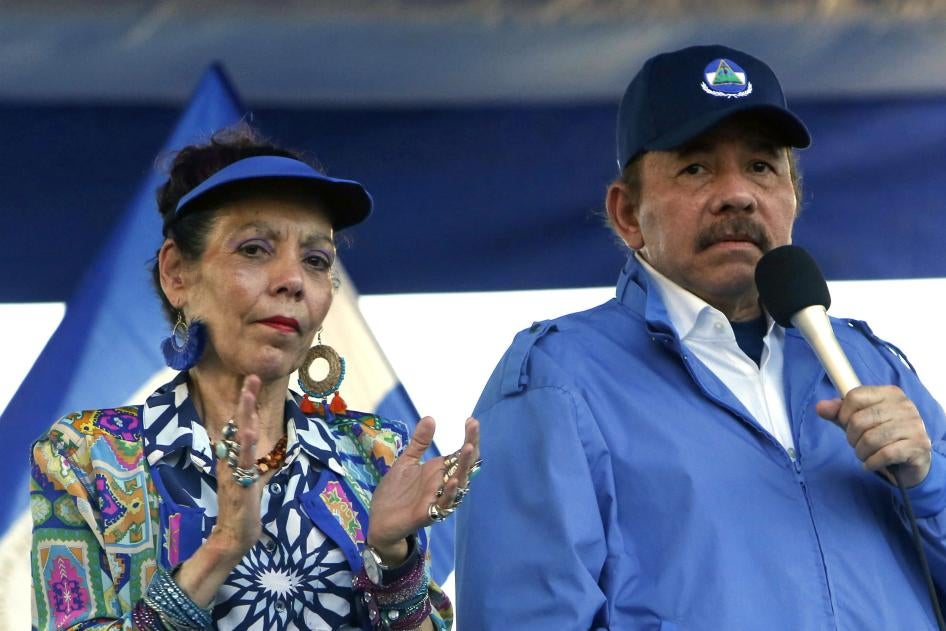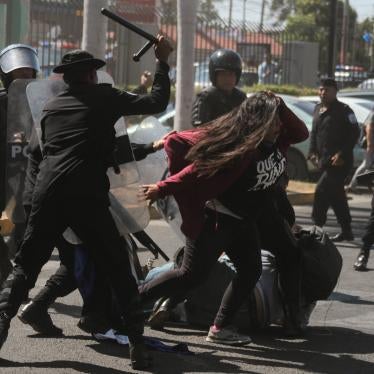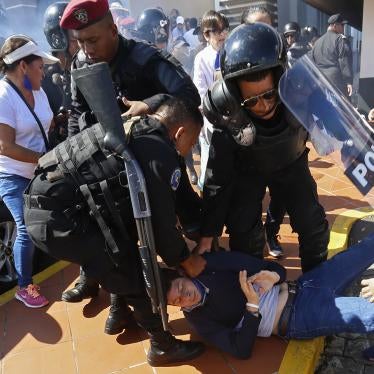The warning came by radio. On June 11, the host of a Nicaraguan radio show that receives substantial government funding said Elton Ortega, a lawyer who had been representing two of Nicaragua’s jailed presidential candidates, was on a list of people defending government critics. The host said the lawyers should be considered “foreign agents” for allegedly receiving foreign funding.
Fearing arrest, Ortega disabled his cellphone and fled, making a muddy, night-time crossing by foot into Costa Rica. His wife, daughter and son followed by the same clandestine route. “It was one of the hardest moments of my life,” Ortega told Human Rights Watch of the decision to flee.
But for government critics and those who defend them, such moments of reckoning are no longer unusual in Nicaragua. As the November presidential elections approach, the government of President Daniel Ortega (no relation to Elton Ortega) has been escalating harassment and prosecutions against them. In October, the legislature passed a law requiring entities and people who receive funding from abroad to register as foreign agents. The law bars such “foreign agents” from participating in “issues, activities or matters of internal or external politics.” It was the first of a new series of repressive laws.
A wave of arrests started in late May, as President Ortega maneuvered to win a fourth consecutive term. As of August 2, seven presidential candidates and at least 20 government critics had been arrested, including several former high-level leaders from President Ortega’s Sandinista political party, as well as journalists, students, and business and community leaders.
Since the 2018 crackdown, more than 108,000 Nicaraguans have fled; two-thirds are seeking refuge in Costa Rica. The gravity of Ortega’s repression will most likely prompt many others to leave, with growing consequences for the region.
Elton Ortega worked as a prosecutor in Managua for 15 years before starting his own practice in 2014. He provided legal counsel to people detained during a brutal crackdown on demonstrations in 2018, and in recent months, he represented two potential presidential candidates: Arturo Cruz, a former ambassador to the United States, and Juan Sebastián Chamorro, executive director of the Civic Alliance for Justice and Democracy.
Cruz was arrested on June 5, Chamorro on June 8. Both were charged with “asking for military interventions,” “organizing terrorist and destabilizing acts with funding from foreign powers,” “requesting, exalting, and applauding the imposition of sanctions against Nicaragua and its citizens,” and “inciting foreign interference in Nicaragua’s affairs.” In both cases, police cited a recent law prohibiting so-called “traitors,” defined in sweeping terms, from running for or holding public office.
Other detainees have been charged with the same crimes, and almost all have been held incommunicado at El Chipote prison, where Human Rights Watch has documented mistreatment, including torture. Elton Ortega was one of only two lawyers able to meet with clients there. But he was barred from a hearing in which Cruz learned the charges against him and in which the court decided to prolong Cruz’s pre-trial detention—applying another recent legal change—to 90 days. On June 9, Ortega and Cruz met for a tense, surveilled 15 minutes.
Ortega is in Miami now, seeking US asylum. Several more lawyers have fled, while others remain, facing threats. During an interrogation in the Nicaraguan Attorney’s General Office on June 8, a member of the Blue and White National Unity opposition coalition provided legal counsel to Felix Maradiaga, an academic and potential presidential candidate from the same coalition. As the two left, police arrested Maradiaga and threatened to “execute” his companion.
By intimidating defense lawyers and forcing them to leave, authorities are denying critics’ rights to choose counsel and to fair trials. The authorities have imposed public defenders on many critics. The Public Defender’s Office reports to the Supreme Court of Justice, the top tribunal in a country where the justice system has been used to prosecute political opponents.
The international community is responding. On August 2, the Council of the European Union imposed targeted sanctions, including asset freezes and travel bans, on eight government officials responsible for serious human rights violations and undermining the rule of law, including Vice President Rosario Murillo. The United States, on July 12, announced visa restrictions on 100 Nicaraguans implicated in in human rights abuses.
Since 2019, the UN Human Rights Council has adopted annual resolutions on Nicaragua. The current and former UN High Commissioners for Human Rights have reported on the deteriorating rights situation. And in June, 59 countries issued a joint statement at the UN Human Rights Council echoing the high commissioners’ concerns, “including persistent impunity for human rights violations since April 2018 and continued reports of arbitrary detention” in Nicaragua.
It’s now UN Secretary-General António Guterres’ turn to escalate the UN’s involvement. He has expressed concern about the arrests of presidential candidates, but Article 99 of the UN Charter would allow him to go further. He can call the Security Council’s attention to any matter that he thinks could “threaten the maintenance of international peace and security.” Nicaragua fits the criteria, given the grave human rights violations and the resulting migration’s impact on the region.
Security Council members, in turn, should request briefings from Guterres and the high commissioner for human rights. Those who argue against this by insisting that Nicaragua isn’t a Syria, Myanmar or Venezuela miss the point. Concerted action now can help prevent Nicaragua’s crisis from spiraling further in the run-up to the November presidential elections.
It’s essential for Guterres and the Security Council to support efforts of the high commissioner and Human Rights Council by demonstrating to the Ortega government that they, too, are watching. Without sustained international pressure, President Ortega is likely to keep cracking down, ignoring the rule of law, and eventually succeed in imposing an election that is anything but free and fair.









